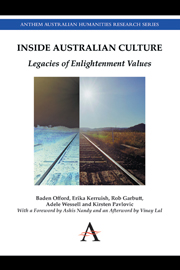Book contents
- Frontmatter
- Contents
- Foreword. Is Australia a Victim of the Ethical Limits of the Enlightenment? A Modest Foreword for an Immodest Venture
- Preface and Acknowledgements
- Chapter One Introduction
- Part One Getting Inside Australian Public Culture
- Part Two Three Moments of the Enlightenment
- Part Three Working with the Necessary Other
- Afterword. The Emptiness Within and Without: Enlightenment Australia and Its Demons
- Notes
- Index
Afterword. The Emptiness Within and Without: Enlightenment Australia and Its Demons
Published online by Cambridge University Press: 05 October 2014
- Frontmatter
- Contents
- Foreword. Is Australia a Victim of the Ethical Limits of the Enlightenment? A Modest Foreword for an Immodest Venture
- Preface and Acknowledgements
- Chapter One Introduction
- Part One Getting Inside Australian Public Culture
- Part Two Three Moments of the Enlightenment
- Part Three Working with the Necessary Other
- Afterword. The Emptiness Within and Without: Enlightenment Australia and Its Demons
- Notes
- Index
Summary
‘Happy families are all alike’, says the famous line with which Tolstoy commenced his novel Anna Karenina, and ‘every unhappy family is unhappy in its own way’. I suspect that as much is true of nations: all happy nations, in the conventional wisdom, are happy in much the same way, largely attentive to the minimal material needs of their subjects, protective of those rights to freedom of speech, mobility and religious worship which may be considered as fundamental to notions of human liberty and dignity, and energized by a citizenry that is not merely well-fed but at least in principle invested in the idea that, in the words of Mohandas Gandhi, ‘the good of the individual is contained in the good of the all.’ And, yet, if Tolstoy may be stretched some, nations appear to be unhappy also for very much similar reasons, afflicted by familiar problems of racism, sexual discrimination and class inequality, myopically protective of what is termed national self-interest, often wary of the stranger, or besotted by those myriad social ailments that the ingenuity of man has created.
Nevertheless, it may be that each nation has to confront demons that are particularly its own, which may be one way of describing the subject matter of Inside Australian Culture: Legacies of Enlightenment Values. Every word in this title, as the authors are all too aware, invites discussion, interrogation, even disagreement.
- Type
- Chapter
- Information
- Inside Australian CultureLegacies of Enlightenment Values, pp. 115 - 122Publisher: Anthem PressPrint publication year: 2014



